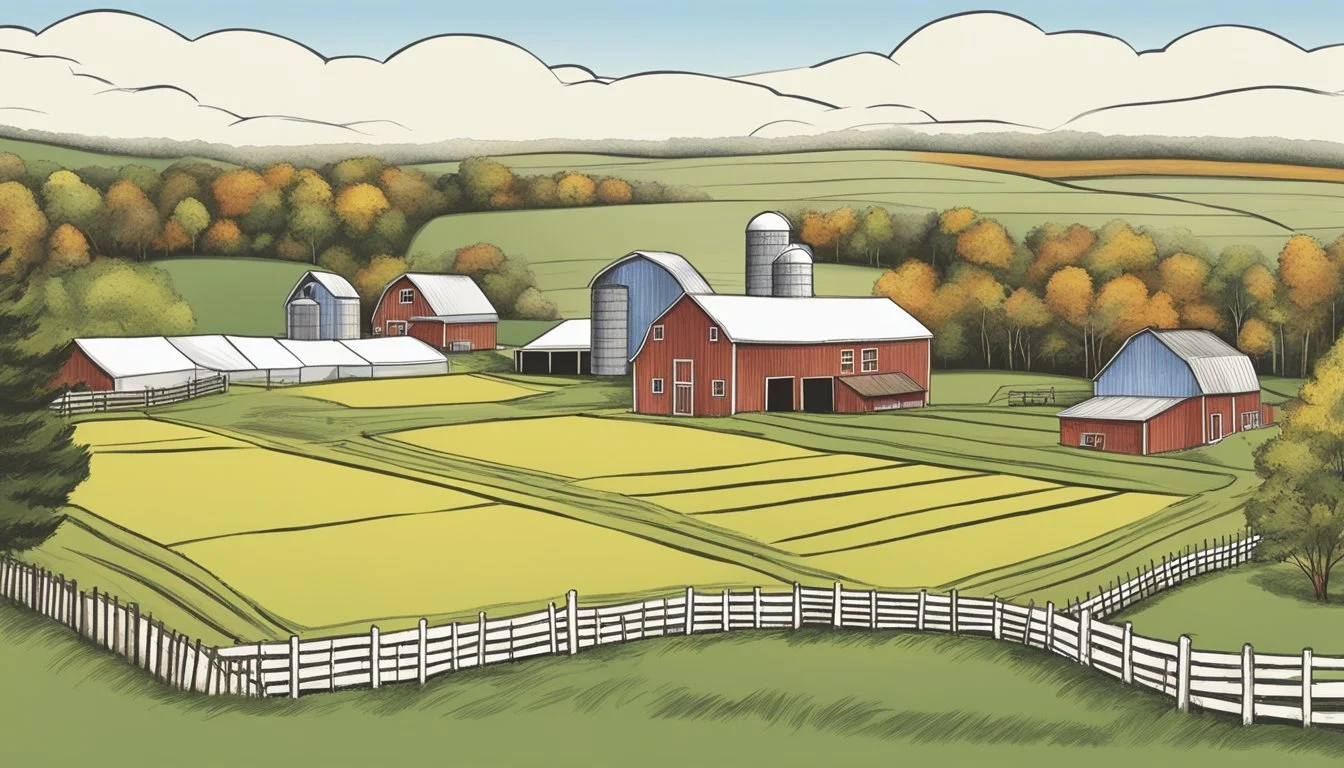Rhode Island Farm Land for Lease
Opportunities for Cultivating Success
This Article is Part of Our Guide on Navigating Agricultural Leases Across the US
In Rhode Island, leasing farm land offers agricultural professionals and newcomers an opportunity to engage in farming activities without the financial burden of purchasing property outright. With its diverse climate and fertile soil, the state presents various options for cultivating crops and raising livestock. Leasing land is a practical approach to accessing farmland and provides flexibility for both landowners and lessees. It allows for more immediate entry into the agricultural sector, which may be particularly appealing to those who want to start small or experiment with different types of farming.
The market for leasing farm land in Rhode Island is dynamic, encompassing a range of sizes and types of land suitable for various agricultural needs. From small plots ideal for organic gardens to larger acreages fit for extensive farming operations, the state's offerings cater to a myriad of farming ventures. There are resources and organizations in Rhode Island dedicated to connecting landowners with prospective lessees, ensuring a match that benefits both parties and promotes the continuation and growth of local agriculture.
Given Rhode Island's commitment to preserving its agricultural heritage, one will find state Ag Land leases and supportive networks such as Land for Good, aimed at helping individuals locate the right piece of farmland. These entities work to ensure that farmland remains productive and accessible. In doing so, they support the local economy and assist in sustaining the state's agricultural landscape. Whether one is an experienced farmer or new to the field, leasing farm land in Rhode Island could be a strategic move towards cultivating a successful agricultural enterprise.
Overview of Rhode Island Farmland
Rhode Island's agricultural sector exemplifies a vibrant blend of diverse crops and farmland stewardship. The state is committed to preserving and providing access to agricultural land to ensure a thriving farm economy.
State of Agriculture in Rhode Island
Rhode Island's agricultural landscape is characterized by a wide range of crops, despite the state's small size. The state values its farmland for the role it plays in the local economy and for providing fresh, local produce to the communities. Agricultural land in Rhode Island is limited, making every acre valuable for both current farming and future generations. The state has a high percentage of direct sales from farms to consumers, underscoring the importance of local agriculture.
Leading crops: Various, including nursery stock, dairy products, vegetables, and fruits
Total farmland: Approximately 69,000 acres
Farms: Over 1,200
Avg. farm size: 50 acres
Rhode Island Farmland Access Program
The Rhode Island Farmland Access Program plays a critical role in sustaining agriculture within the state. It is an initiative designed to assist farmers in accessing farmland through a process that is both transparent and fair. The program purchases farmland from willing sellers at fair market value, imposes an agricultural easement that ensures the land is used exclusively for farming, and then sells it at a more accessible rate to qualified farmers.
Objective: To preserve agricultural land and support a new generation of farmers
Method: Purchase farmland, establish an easement, sell at agricultural value
Leasing Process and Guidelines
When considering leasing agricultural land in Rhode Island, one must be aware of the specifics involved in the leasing process and the legal framework that governs such agreements.
Understanding Farmland Leases
A farmland lease is a legally binding contract between a landowner and a farmer. The lease grants the farmer the right to use the land for agricultural purposes for a specified period of time. There are several types of leases, but they generally fall into two categories: cash rent leases and share leases. In a cash rent lease, the farmer pays a set amount of rent regardless of crop production levels. On the other hand, a share lease involves the farmer and the landowner sharing the costs and proceeds of the farmed agricultural products.
Before entering into a lease, both parties should agree on certain terms including, but not limited to:
The duration of the lease
The amount of rent or the percentage share of income and expenses
Specific use of the property
Maintenance responsibilities
Conditions for renewal or termination of the lease
Legal Considerations in Rhode Island
Rhode Island's legal landscape shapes the land leasing process. The state's laws ensure that leasing agreements adhere to regulations that protect both landowners and tenant farmers. Here, it's critical to understand the Farmland Preservation Act and regulations by agencies like the Agricultural Land Preservation Commission which influence farmland use and rights in Rhode Island.
Key legal documents and steps that should be taken include:
A detailed lease agreement in writing
Clear identification of all parties involved
A thorough description of the leased premises
Legal compliance such as zoning regulations, environmental laws, and tax implications
It is advisable for both lessors and lessees to consult with legal professionals specialized in Rhode Island agricultural law to ensure that all state-specific legal requirements are met and that their interests are adequately protected.
Farmland Availability and Listings
In Rhode Island, individuals seeking to lease farmland will find several listings across various counties. Availability can fluctuate, so utilizing resources like the New England Farmland Finder and Land for Good proves essential for staying updated on the latest properties.
Discovering Farmland for Lease
Prospective lessees can browse an array of listed properties for lease in Rhode Island, often filtered by factors such as acreage and county. These properties range in size and location, providing options for various agricultural needs. A useful tool for this process is the New England Farmland Finder website, a platform dedicated to connecting land seekers with available farmland across the region.
Available listings of interest include:
Suffolk County: 12 acres
Monmouth County: 5 acres
Sullivan County: 8 acres with a 1,700 sq ft residence
Providence County: 2.59 acres
Land for Good and New England Farmland Finder Resources
Land for Good operates within Rhode Island to assist individuals in securing farmland. They offer personalized consultations to navigate the leasing process, which can be especially helpful for those new to agricultural land leasing. Additionally, Land for Good provides access to current lists of State Ag Land leases, representing key resources for farmland seekers.
New England Farmland Finder, on the other hand, allows for a broader search, listing available farmland throughout the New England area. This service offers an online map feature easing the search process by location and preferred land attributes, catering to a targeted approach in finding suitable farmland.
Financial Aspects of Farmland Leasing
Leasing farmland in Rhode Island involves various costs and potential incentives. Landowners and farmers must navigate these financial considerations to establish sustainable and mutually beneficial lease agreements.
Cost Factors in Leasing Farmland
In Rhode Island, the cost of leasing farmland can vary widely. Rent for farmland is influenced by several factors:
Land Quality and Location: Prime agricultural land with favorable soil, topography, and access to markets typically demands higher rent.
Lease Duration: Long-term leases can impact the rental rate, potentially offering more stability in cost for both parties.
Lease Type: The structure of the lease, whether a fixed cash rent, a flexible cash rent, or a crop share lease, affects the cost. Cash rent implies a fixed payment, whereas in crop share leases, both the landowner and farmer share the costs and revenues, which can affect tax implications.
The lease should also clearly outline who is responsible for additional expenses, such as property taxes, insurance, conservation improvements, and routine maintenance.
Incentives and Support for Farmers
Farmers in Rhode Island may have access to several incentives and support resources that can make leasing land more affordable:
Government Programs: Subsidies or cost-sharing programs can be available to support sustainable farming practices or beginning farmers.
Non-Profit Initiatives: Organizations may offer grants or technical assistance to farmers to help reduce the initial costs of leasing and farming land.
Tax Considerations: There are unique tax benefits and implications for both lessors and lessees involved in agricultural leases. It's essential to understand these to optimize financial planning.
Lessees and lessors must ensure they are informed about these opportunities and take them into account within their lease agreements to ensure financial clarity and stability.
Challenges and Considerations
When leasing farmland in Rhode Island, lessees and landowners face challenges that centre around sustainable farming and land preservation. Effective solutions require a clear vision and an understanding of the long-term implications of agricultural practices.
Sustainable Farming Practices
Sustainable farming aims to meet current agricultural needs without compromising the ability of future generations to meet theirs. Lessees in Rhode Island should consider:
The impact of their farming on soil health and biodiversity.
The use of agricultural practices that reduce chemical inputs and conserve water.
Landowners and farmers need to align their operations with a vision for sustainability that ensures both economic viability and environmental stewardship.
Land Preservation and Sustainability
The Agricultural Land Preservation Commission (ALPC) seeks to preserve Rhode Island's farmlands. Prospective lessees must navigate:
Regulations that prioritize soil quality and agricultural viability.
Criteria for land preservation programs that protect critical resources and maintain open space.
It's crucial that lessees support these goals and adhere to guidelines that facilitate land preservation and sustainability for continued agricultural use.
By focusing on these considerations, those involved in leasing farmland in Rhode Island can contribute to a resilient and sustainable agricultural sector.
Farmer and Landowner Resources
Rhode Island offers a variety of resources for both landowners interested in leasing their land for farming and for those seeking farmland to lease. These resources aim to support the agricultural community by facilitating access to farmland and offering guidance on how to manage these leases effectively.
Assistance for Landowners
For landowners looking to lease their agricultural land, Land for Good is an organization that can offer individualized support. They provide comprehensive services including helping landowners understand the benefits and logistics of leasing to farmers. They also guide through the lease drafting process to ensure clear terms and sustainable arrangements. Landowner assistance is vital for maintaining Rhode Island's agricultural assets and ensuring they are used productively.
Networking and Support for Farmland Seekers
Farmland seekers, including experienced farmers and those new to the industry, can explore opportunities through the Rhode Island Farm Bureau Farmland Opportunities. This platform lists available State Ag Land leases and can be a starting point for farmers looking for land. Additionally, the Rhode Island Department of Environmental Management (RIDEM) manages various properties like Snake Den Farm, leased to farmers for long-term arrangements, providing resources such as water access and barn storage. Farmland seekers can contact individuals such as Marina Capraro for more details on available land and lease terms. For personalized service, Michelle Sheehan acts as a contact point offering support for farmers in navigating their search for suitable farmland.
Agricultural Opportunities by State
Rhode Island offers various agricultural lease opportunities that support the local economy and conservation of wildlife.
Farming Prospects in Nearby States
The northeastern region of the United States presents diverse farming opportunities with individual state programs and incentives aimed at boosting local agriculture.
Massachusetts (MA): They focus on diverse crop production and have support systems in place for local farmers, including grants and marketing assistance.
Connecticut (CT): They leverage its agritourism and niche markets, providing a variety of leasing options for farmland.
New York (NY): They prioritize dairy, fruit, and vegetable farming, often with a strong research and development support network.
Maine (ME): Known for its blueberries and potatoes, they offer leases for land conducive to both traditional and organic farming.
New Hampshire (NH): They have programs that promote small-scale, local farming operations, often in scenic, rural settings.
Vermont (VT): A leader in organic farming, they offer a range of resources and land options for sustainable agricultural practices.
Conclusion and Future Outlook
The landscape for farmland leasing in Rhode Island has been characterized by shifts towards more sustainable and intensive agricultural practices. It incorporates the integration of cutting-edge research and developments in greenhouse technologies.
Anticipating Trends in Farmland Leasing
The demand for farmland is a crucial factor influencing real estate trends in Rhode Island. With the emergence of large greenhouses, agricultural land usage is evolving, potentially offering more year-round production capabilities. This shift may inflate the value of currently available farmland for lease. Prospective tenants should be prepared for a market that is increasingly influenced by:
Innovative farming methods: Intensive greenhouse farming could become more prominent, leading to a rise in land values.
Land availability: Opportunities to purchase farmland may become competitive, as interested parties seek to secure land tenure amidst a growing trend of land conservation and the promotion of smaller, sustainable farming units.
Agricultural policy: State-led initiatives and farmland preservation efforts could shape future leasing structures and opportunities.
The real estate market's response to these trends will likely determine the availability and cost of farmland for lease in Rhode Island. Emerging farmers and investors should stay informed about policy changes and land availability to navigate the leasing landscape effectively.
Appendix
This section provides targeted resources and comprehensive listings for individuals seeking farmland leases in Rhode Island.
Additional Resources and Information
The Rhode Island Farm Bureau and the Rhode Island Department of Environmental Management offer programs such as the Farmland Access Program, which facilitate the process of purchasing protected farmland to sell to farmers. The Rhode Island Farmland Access Clearinghouse is also a key resource that supports Rhode Island’s agricultural growth by connecting new and existing farmers with available farmland.
Detailed State Listings for Farmland
Providence County, RI: Currently, farmland listings include a 2.59-acre plot available for lease.
Statewide Opportunities: The LandCashin marketplace is a platform where interested parties can find various plots of crop farm land available for rent across the state of Rhode Island.
Information about Rhode Island's programs, current offerings, and detailed land listings are essential tools for those seeking to lease agricultural land within the state.










